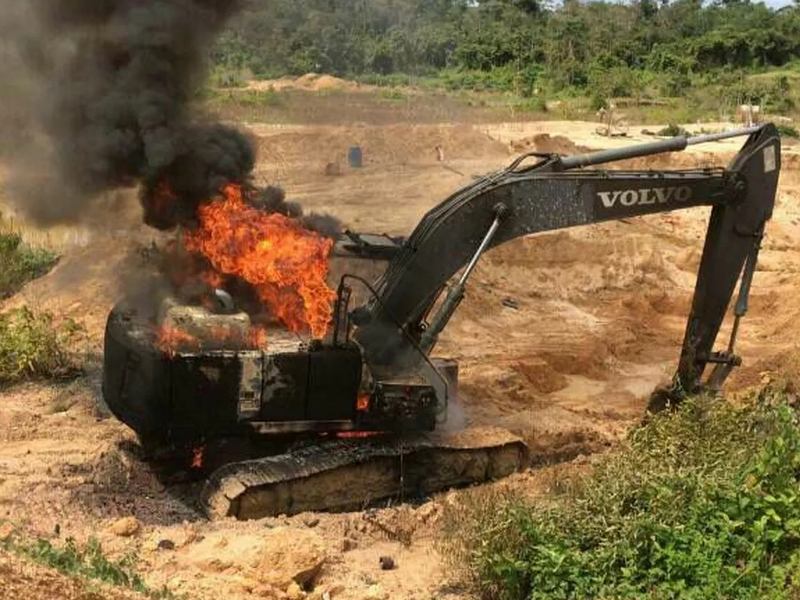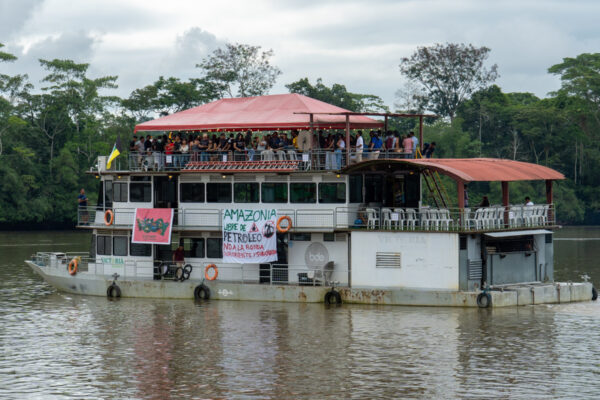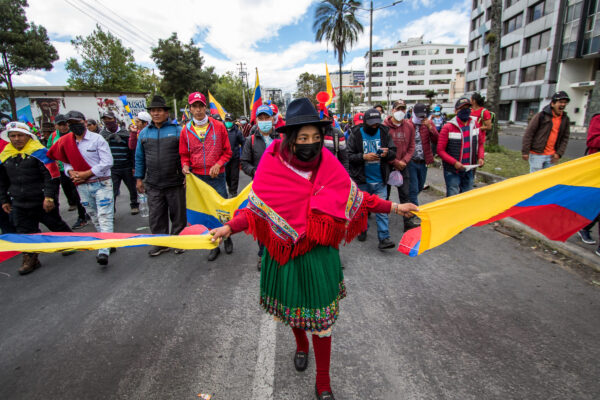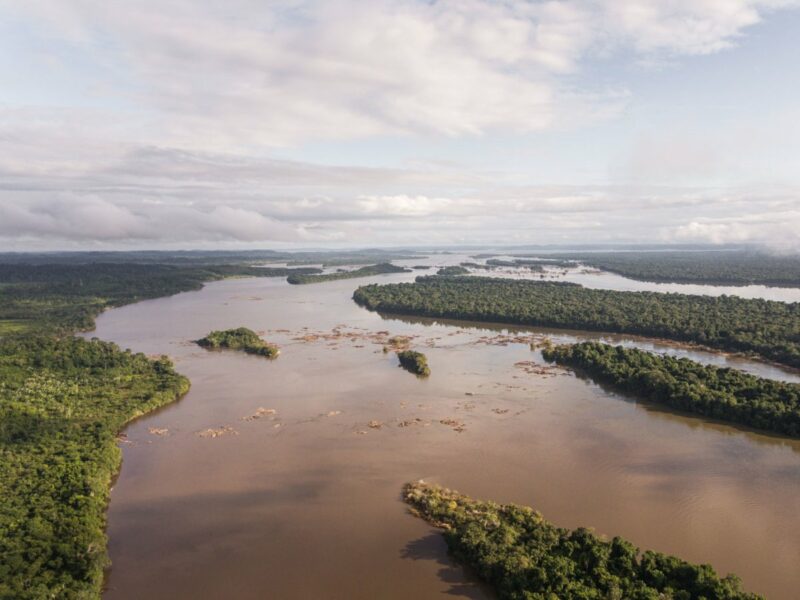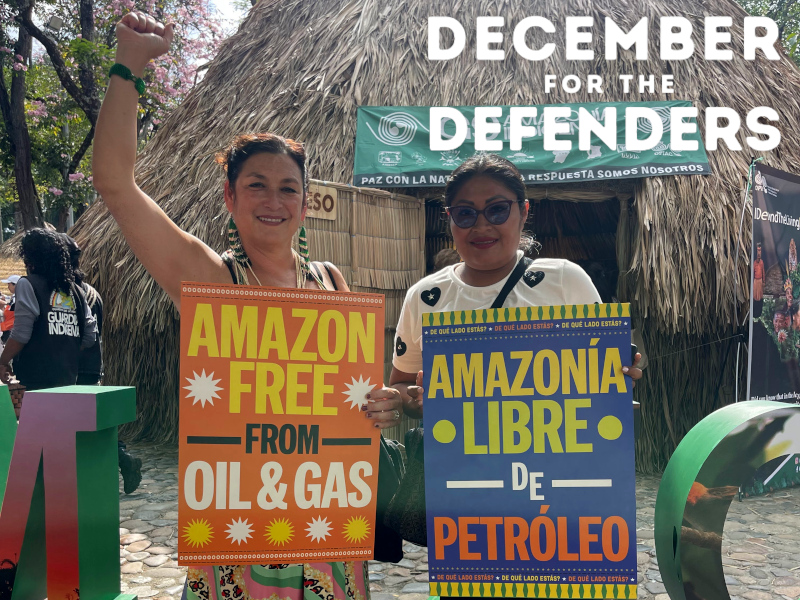Last month, a series of police and military actions in the remote forests of Brazil’s Tapajós basin struck at the foundation of a flourishing criminal gold mining network. Acting upon information provided by Munduruku leadership seeking to end this toxic industry, law enforcement destroyed heavy equipment, fined wildcat miners, and raided the offices of local gold traders.
These actions signaled decreasing government tolerance for extensive illegal mining operations in the Brazilian Amazon. The government action that followed, however, set ambiguous precedents for future enforcement and led to intensified direct threats upon Munduruku leaders fighting to defend their lands and culture from more mining.
Police operations against illegal mining in the Tapajós are not unheard of. Previous high profile actions featured pinpoint strikes that destroyed mining dredges and other equipment. However, “Operation Angry Chief” (Operação Pajé Brabo), as this recent action was dubbed, demonstrated heightened sophistication and the coordination of several government entities including the two enforcement branches of the Ministry of the Environment, IBAMA and ICMBio, the federal indigenous agency FUNAI, and the office of Federal Prosecutors (MPF).
The operation destroyed eight backhoes and one tractor responsible for leveling forests and gouging deep, toxic pools within the Crepori National Forest and the Munduruku Indigenous Territory. Meanwhile, IBAMA fined wildcat miners $13 million for their role in these activities, which poisons waterways, local communities, and wildlife with mercury. The negative impacts of these illegal activities garnered national media attention in February when Munduruku warriors led an independent action to drive the miners from the region and expel what they call the “white man’s illness” from their lands, presenting the miners with an ultimatum to depart.
Prior to the warriors’ action, the Munduruku’s Ipereg Ayu movement issued a statement decrying that as a result of the mining activities, the indigenous village “Posto de Vigilancia” (originally established to protect Munduruku lands from invaders) had ceased to exist. “The miners invaded everywhere and corrupted our people, killed the forest and the farms, brought illness, prostitution, alcoholism among the men and women and drugs to our young,” they wrote. Indeed, the devastation of Posto de Vigilancia, which was transformed from an outpost for territorial vigilance into a source of environmental devastation and rights abuse is emblematic of the Amazon’s lawless frontier.
“What we see here is deeply concerning,” said Alessandra Kaba, the coordinator of the Munduruku’s Pariri Association. “We live in the midst of capitalist exploitation, where everyone controls our territory except us, as if we were slaves. What we seek is autonomy.”
As May’s police actions played out in mining camps, they staged a parallel operation entitled “Midas’ Dilemma” (Operação Dilema de Midas), raiding the offices of the major regional gold trader Ourominas in Santarem, and seizing three kilos of gold, millions in cash, weapons, cellphones, and computers. Prosecutors have found that Ourominas bought $19 million in gold between 2015 and 2017 and have demonstrated that 100% of Ourominas gold purchased in 2015 was of illegal origin. The investigation also revealed that Ourominas ignored Brazilian tracing regulations for gold purchasing, leading the authorities to charge its owner with organized crime.
This overdue operation revealed the scope of the country’s illegal mining mafia, as well as how ingrained these activities have become in local economies. One press report from the small city of Itaituba claimed that 50-70% of its economy stems from the illegal gold trade.
Such extensive links to the local economies made the police actions deeply unpopular in the region. Additionally, the Munduruku’s outspoken efforts to defend their lands from the miners and other land invaders has led to threats against them, likely from those who have benefitted from these illicit industries. Indeed, Arnaldo Kaba, the Munduruku General Chief, and Maria Leusa Munduruku, the coordinator of the women’s association Wakoborun, have both received death threats stemming from their opposition to illegal mining. The government’s actions have exacerbated these threats by striking at the gold mafia without offering protection for the indigenous whistleblowers who provided the intelligence necessary to act.
Further complicating matters, there are significant numbers of Munduruku people who permit and participate in illegal mining on their territories, despite its profound impacts upon the forests, waterways, fish, and wildlife that form the basis of their food security and traditional way of life. The federal police operations intensified divisions within the Munduruku nation without offering alternative economic opportunities for communities that have grown dependant on mining revenues.
In a highly-questionable legal recommendation that sought to address this dynamic, a federal prosecutor suggested that the Munduruku be permitted to carry out artisanal mining activities on their land, taking advantage of the “wealth of the subsoil” only when “absolutely necessary for the subsistence of the group, without using heavy machinery” while guaranteeing the protection of the environment and the equitable distribution of economic benefits. However, rather than meeting “subsistence” needs of the Munduruku, this recommendation sets a precedent that plays not only into the hands of the local gold mafia, whose goal is immediate access to untapped wealth, but also Brazil’s powerful mining industry, which is avidly pushing to open up the Amazon’s vast indigenous lands to industrial extraction.
Compounding these issues, recent reports from the region attest to ongoing illegal mining at multiple sites on Munduruku lands and adjacent, protected forests, signalling that the government operations have achieved little in stamping out this toxic activity. While their broadened scope and impact was initially encouraging, the joint actions of Brazilian enforcement agencies must be sustained – and go much further – to achieve the intended result.
As Maria Leusa Munduruku told the Folha de São Paulo, “Once again, the [police] operation did not do its work.” Given the grave socio-environmental impacts of organized crime in the Amazon, the Brazilian government must reign in local mafias, be they miners, loggers, or land grabbers. However, it cannot do this with isolated actions, nor by allowing its informants – in this case imperiled indigenous leaders – to suffer the brunt of retributions.
With toxic gold mining operations continuing unchecked in the Tapajós basin’s forests, we must also look toward the markets that enable this wanton destruction upon primary rainforests. While still preliminary, the MPF’s investigation into the consumers of Brazilian conflict gold could shine a spotlight on the global name brands that are party to these crimes. And once this information comes to light, Amazon Watch and our partners will campaign to sever these supply chains, which are so deadly to the Amazon and the forest communities who call it home.


